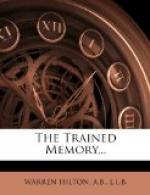There are, then, conscious complexes and subconscious complexes, complexes of consciousness and complexes of subconsciousness.
[Sidenote: The Subconscious Storehouse]
And of the complexes of subconsciousness, some are far more readily recalled than others. Some are forever popping into one’s thoughts, while others can be brought to the light of consciousness only by some unusual and deep-probing stimulus. And the human mind is a vast storehouse of complexes, far the greater part buried in subconsciousness, yet somehow, like impressions on the wax cylinder of a phonograph, preserved with life-like truth and clearness.
Turn back for a moment to our definition of memory. You will observe that its second essential element is Recall.
Recall is the process by which the experiences of the past are summoned from the reservoir of the subconscious into the light of present consciousness. We necessarily touched upon this process in a previous book, in considering the Laws of Association, but here, in relation to memory, we shall go into the matter somewhat more analytically.
THE LAWS OF RECALL
[Illustration: Decorative Header]
CHAPTER IV
THE LAWS OF RECALL
[Sidenote: The Law of Integral Recall]
Law I. The primary law of recall is this: The recurrence or stimulation of one element in a complex tends to recall all the others.
In our explanation of “complex” formation we necessarily cited instances that illustrate this principle as well, since recall is merely a reverse operation from that involved in “complex” formation.
[Sidenote: What Ordinary “Thinking” Amounts to]
For example, in running through a book I come upon a flower pressed between its pages. At once the memory of the friend who gave it to me springs into consciousness and becomes the subject of reminiscence. This recalls the mountain village where we last met. This recalls the fact that a railroad was at the time under process of construction, which should transform the village into a popular resort. This in turn suggests my coming trip to the seashore, and I am reminded of a business appointment on which my ability to leave town on the appointed day depends. And so on indefinitely.
Far the greater part of your successive states of consciousness, or even of your ordinary “thinking,” commonly so-called, consists of trains of mental pictures “suggested” one by another. If the associated pictures are of the everyday type, common to everyone, you have a prosaic mind; if, on the other hand, the associations are unusual or unique, you are happily possessed of wit and fancy.
[Sidenote: The Reverse of Complex Formation]




